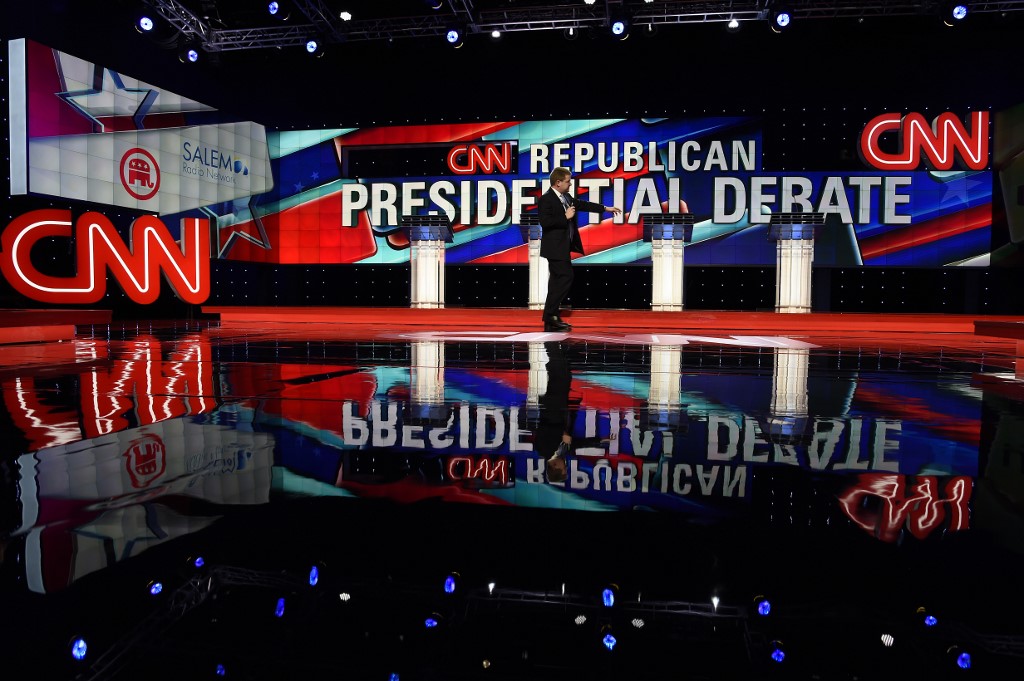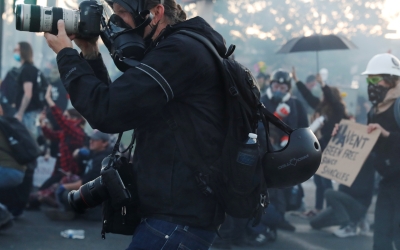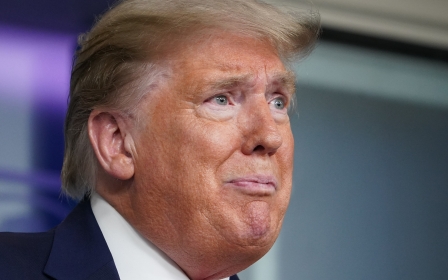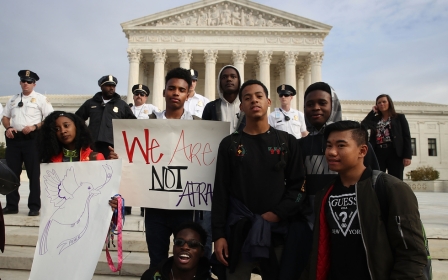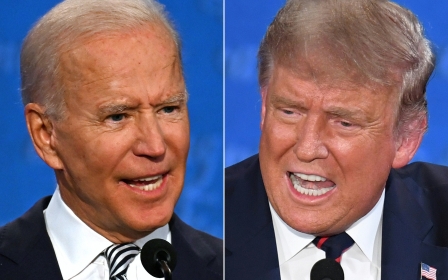The Trump show can end. Here's how
US President Donald Trump and the media: they were made for each other:
There’s no doubt Trump likes the limelight. It’s something he’s been taken with since he started as a developer in New York City and became a national personality for his high-profile divorces, financial management that often left him rich but bankrupt, and as a late-night guest on talk shows to talk, among other things, politics.
And then there is the media. Having been in journalism all my life (starting with dictating letters to the editor at about age eight), I sense that those of us in the business like to hear the sound of our own voices and to read our own words - sans the mistakes and misspellings that creep in. We also like to think of ourselves as the heroes, doing the work for “the people”.
Trump knows that media systems are failing, and many news organisations, big and small, need him to boost their ratings and relevancy
Despite the shared love the media and the president have for attention through tweets, bylines and live stand-ups, the main difference between the two sides is that one admits their attraction to self: the president. Rarely do journalists like to be the centre of attention; we are and try not to be the story. Still, what journalists have spent the last five years or so doing with Trump - perhaps more than calling him out for his policies - is trying to position themselves as experts on democracy, watchdogs and critical friends.
That assessment is a bit disingenuous, though, and it takes some unwinding of a wicked web to understand the codependency between the president and the media that doesn’t - and shouldn’t - let journalists off the hook so easily for their role in things.
New MEE newsletter: Jerusalem Dispatch
Sign up to get the latest insights and analysis on Israel-Palestine, alongside Turkey Unpacked and other MEE newsletters
While Trump has been blatantly honest about policies that to many are disgusting and immoral - such as locking up human “animals” who cross the US southern border in search of refuge and opportunity, and reinforcing racist tropes about non-white Americans protesting for justice in the streets - journalists have taken this as a chance to push their own agendas.
It’s unclear how much “watchdogging” is the tail wagging the dog, or journalism advocating for its own obsessions of attention, profits and authority.
Some examples: the dedication to Trump’s every move, every tweet. The rationalisation and legitimisation of his speech and presence as being normal (a trend that, thankfully, has changed a bit recently), and the contribution to confusion over just how much Trump’s actions and rhetoric are somehow independent of the American psyche.
We do have to remember that people voted for him in the first place, and even under previous presidents, the US has stood as a hegemonic force internationally. Certainly on the domestic front, it has long bred its contestation surrounding race, gender, class and civic participation.
Doing more with less
To be clear, for those who think this is a “blame the media, not Trump” argument, we should note that not all journalists or journalism are the same. Clearly, reporting is an increasingly dangerous gig, even in areas that claim to be democracies. And journalists are under immense stress and strain in a digital and social media age to “do more with less”.
In addition, not all journalists have the same resources or remits. Local papers in the rural US are doing their best to cover daily events, to make sense of changing business models, and to keep their doors open. In turn, news deserts - where wide geographies and communities have no news coverage at all - are expanding, and the evidence that power is running amok in those places is clear.
So, the burden of responsibility for today’s messiness in politics and the fragmentation of society (before, during and after Trump), perhaps, could be less on the media than on other powers-that-be. But that’s too easy an explanation.
While there are great differences between local news and national news in the US - not just in terms of what they cover and how, but also in terms of their physical and ideological position vis-a-vis the power elite - these are the agenda-setting folks who influence other mainstream outlets across the country and the world.
What they say goes, in terms of how to cover such things as an election, a sick (and/or healing) president, an ailing economy, and militarised domestic police forces. Going against their take, even in local news, can lead to serious confusion among audiences and result in pushback, the pullout of advertisers, and a dip in their legitimacy and authority in the field.
Industry failures
Indeed, we saw the push-down of one major media chain, Sinclair, that forced its anchors to read aloud a pre-penned statement arguing that their news was truth, while other outlets (that happened to be critical of Trump) were fake. And we can’t forget that the former CEO of CBS, Les Moonves, said in 2016 about the Trump campaign: “It may not be good for America, but it’s damn good for CBS.”
Trump knows that media systems are failing, and many news organisations, big and small, need him to boost their ratings and relevancy. People on his team know this, too. Now, I’m not arguing that Trump does what he does to help flailing media enterprises - I truly believe he hates media and messages that don’t agree with him - but he knows that journalists can’t say “no” to covering his antics. Covering him is in their best interests.
Journalists have told us all of this, repeatedly. In the UK, the government is pushing for news outlets to stay open. In the US, one of the nation’s industry think-tanks catalogues the closures, layoffs and demise of its own industry.
Reminding people how bad the business model is can’t actually be good for business. Perhaps everyone already knows what’s happening to journalism, and either don’t care, notice, or feel anything can be done about it. Last month, for instance, El Nuevo Herald, a Spanish-language sister outlet to the Miami Herald, was found to have published dozens of paid inserts funded by a conservative group that called former First Lady Michelle Obama a “black monster” and Africa the “ass of the world”.
The insert resulted in a few complaints via social media. The managing editor subsequently resigned. An internal investigation found “significant lapses” in the handling of the insert, noting there had been no “formal content review” and newsroom staff had not been alerted to its contents.
Among the many reasons this might have happened was that journalists don’t even read their own newspapers, which means, likely, audiences don’t either.
The path forward
The public continues to watch more and more TV and social media clips, as do journalists. The politicised and sensationalised aspects of these sources relate to and rely on celebrity personalities - which Trump himself curated from his time on The Apprentice - to push the news agenda as a form of reactionary reporting.
Where does this leave the wicked web of codependence, weeks away from a US presidential election, amid a crippling pandemic, and in an age that needs more hope, some say (though I argue for “constructive pessimism”)?
As journalists and journalism continue to serve a reactionary and narrow focus on everyday life ... they will continue to be enticed and manipulated by populist politicians
As journalists and journalism continue to serve a reactionary and narrow focus on everyday life, moving closer to political debate and further from local and regional issues that can be made important for national audiences (despite concerns about the “CNN effect”), they will continue to be enticed and manipulated by populist politicians and personalities.
The solution, for now, may just be for the media to dump Trump, take a minimal hit for ignoring his antics, and spend their time returning to what made journalism good in the first place (enter a bit of nostalgia here): storytelling about everyday life, investigations into wrongdoings, and news coverage that is diverse and global, coming from all parts of the US and the world to unveil ill - but in doing so, bring us back together.
The views expressed in this article belong to the author and do not necessarily reflect the editorial policy of Middle East Eye.
Middle East Eye delivers independent and unrivalled coverage and analysis of the Middle East, North Africa and beyond. To learn more about republishing this content and the associated fees, please fill out this form. More about MEE can be found here.



